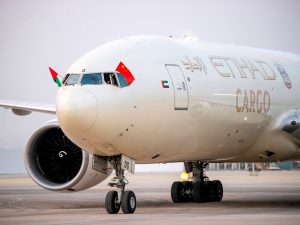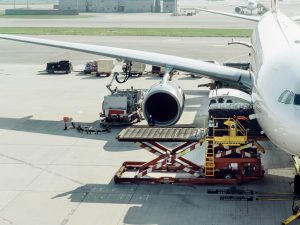ColdStar Logistics has expanded its network by opening three new facilities — two in Mumbai and one in Sonipat. The firm’s objective was to cater to the growing demand for fresh and perishables. The three new hubs will handle, process and distribute Fruits & Vegetables (F&V) and other perishables to leading e-commerce platforms. The Sonipat unit, spanning 80,000 sqft, has a capacity of 1,70,000 units (65 tonnes) a day, while the Mumbai sites together add 2,20,000 units daily (collectively 3,200 tonnes). The capacity of the Mumbai units is 1,40,000 from the F&V hub and 80,000 from the cold storage unit.
Read More »‘AI, Blockchain must for driving efficiency in air cargo biz’
At the recently concluded Central Asia Air Cargo Summit in Tashkent, Parvinder Singh, Managing Director, Hans Infomatic, focused on importance of technology upgradation to improve operational logistics efficiency. He said, “India and global markets are adopting: blockchain for secure, decentralised data management, IoT to integrate smart devices into supply chains, AI for: predictive analysis, system reviews, and real-time strategy updates. These technologies have started gaining traction since 2025. However, they rely heavily on cloud computing to function. In India, efforts have been made to modernise logistics and cargo business by removing outdated carbon-based systems, reducing dependency on remote/manual systems, and eliminating errors at the state and operational levels through digital tools.”
Read More »Etihad Cargo unveils SmartTrack to enhance visibility
Etihad Cargo has officially launched SmartTrack, its premium shipment visibility service that enables the customers to monitor their cargo shipments in real-time. SmartTrack tool is now available to the customers worldwide through the Etihad Cargo website, making it the first air cargo carrier to bring such advanced smart tracking technology to market, according to a press statement.
Read More »AISATS begins domestic handling ops at Swami Vivekananda Airport
Air India SATS Airport Services (AISATS) has commenced domestic cargo handling ops at Swami Vivekananda Airport, Raipur, as the airport’s official Operator & Management (O&M) service provider. The facility will feature planning, real-time cargo tracking, and digitised documentation processes to accelerate freight movement, reduce dwell times, and improve operational predictability. As the certified regulated agent (RA) at Raipur Airport, AISATS will ensure rigorous screening, precise labelling, and secure dispatch in compliance with global safety, security, and quality benchmarks. Equipped to handle a diverse cargo portfolio, including pharma, perishables, high-value goods, and industrial machinery, AISATS operations will enable Chhattisgarh’s industries a quicker access and seamless connectivity to national and global trade hubs.
Read More »Samir J Shah named ACAAI President
The Air Cargo Agents Association of India (ACAAI) has announced the election of its new Managing Committee. Samir J Shah has been elected as the new President, succeeding C K Govil, who has stepped down from the role. The newly appointed office bearers include Vikram Kumar as Vice President, Chaitaly Mehta as Honorary Secretary, and Dinesh Krishnan as Honorary Treasurer.
Read More »Bhadkamkar elected as the new AMTOI President at 26th AGM
Shantanu Bhadkamkar, Managing Director, ATC Global Logistics, has been elected as AMTOI President for the term 2025-2026 during its 26th Annual General Meeting. He succeeds former President Arun Kumar. The newly elected Managing Committee aims to continue promoting efficiency, policy advocacy and growth within the country’s multimodal logistics sector.
Read More »Allcargo warehousing capacity grows to meet festive demand
Allcargo Gati Limited has expanded warehousing capacity with an additional 40,000 sqft in Bengaluru, 17,000 sqft in Kolkata and between 70,000 and 1,00,000 sqft in Chennai, with plans to add 1,20,000 sqft in Kolkata. “We are geared up to cater to the festive demand with reinforced capacity, expanded workforce, strategic technology deployment, and comprehensive training modules,” Ketan Kulkarni, MD and CEO, Allcargo Gati Ltd and GESCPL. On the manpower front, Allcargo Gati is expanding its workforce by 30 per cent, deploying 9,000 employees across operations, including 4,500 dedicated to the e-commerce sector, he added. By combining new-age technology-driven operations with proven expertise, the firm has created the required bandwidth to cater to the festive demand. The GST revision is proving to be beneficial for express logistics players, which translates into more competitive pricing and faster deliveries for customers. We will continue to deliver seamless logistics solutions across metro and tier II, III and IV markets with speed, precision, and agility,” Kulkarni added.
Read More »SGL expands logistics footprint in Indian market
Scan Global Logistics (SGL) announced its entry into Indian market. SGL’s India operations will begin in Chennai, Delhi, and Mumbai, with Mumbai serving as the head office. The local team will be led by professionals from companies such as Maersk, CEVA Logistics, and Rhenus Logistics. By establishing local presence, SGL is positioned to serve MNCs operating in India and Indian firms expanding internationally, offering tailored solutions that align with India’s dynamic economic growth. “Establishing a presence in India has always been a top priority for us. We wanted to enter the market with the right team, customer-first mindset, and spirit of entrepreneurship,” Allan Melgaard, Global CEO of Scan Global Logistics, says. “We are confident this is the perfect time to begin our journey in India. We are starting operations in three key locations, with ambitious plans to rapidly expand our footprint across the country.”
Read More »Digitalisation, cargo security key focus areas in Uzbekistan
Focussing on the current trends, opportunities and challenges in Central Asian nations, Rizwan Siddiqui, Country Manager Central Asia, IATA, informed, “One of the major issues in Central Asia is very high jet fuel prices.” He was speaking at the ongoing Central Asia Air Cargo Summit in Uzbekistan. “This creates a lot of pressure on the freight forwarders,” he added. Another important issue is slow adoption of technology. IATA is struggling to have complete air cargo data from Central Asian. “So far, we have four IATA-accredited airline agents in Uzbekistan. We have launched Data Sharing initiative to improve market intelligence, airlines competency, and overall operational efficiency through our apps, such as BPS and CAAS. We are discussing this with 25 airlines. These initiatives have many benefits and improve standard data submissions.”
Read More »Central Asia Air Cargo Summit kickstarts today in Tashkent
The second edition of Central Asia Air Cargo Summit will start in Tashkent tomorrow. With 40 airlines, cargo operators, tech innovators, and policy leaders joining the summit — it will bring momentum of the region into sharp focus and help shape the next phase of its development. The event, highlighting Tashkent’s growing role as a strategic hub for global cargo transit, focused on infrastructure development, digitalisation, and regional cooperation. Participants will explore opportunities to streamline operations, improve customs procedures, and expand trade routes connecting Europe and Asia. The forum underscored Uzbekistan’s commitment to becoming a key player in global air logistics. The event is being organised by ATO COMM, an events management company of Ljubljana, Slovenia.
Read More » Cargo Breaking News
Cargo Breaking News









